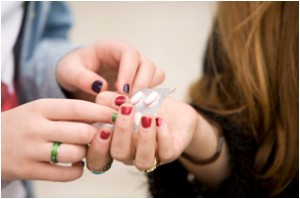 Prescription drug abuse among teens is on the rise
Prescription drug abuse among teens is on the rise
By Patti P. Carter, LPC, MAC
According to the 2007 National Survey on Drug Use and Health (NSDUH), an estimated 22.3 million Americans aged 12 or older struggled with substance dependence or abuse. Gil Kerlikowske, Director of the Office of National Drug Control Policy, told a Senate panel that the U.S. faces an epidemic of prescription drug abuse. He said pills are popular because they are easy to obtain and have a low perception of risk.
“Not my child,” you might say.
Consider this: If you are one of the fortunate individuals who has a lucrative job that includes health insurance, you have easy access to prescription medication. So, where do you store your medication? Did you undergo a root canal a couple of months ago wherein you did not use all your pain medication? What did you do with the leftovers? While you may assume they are still tucked away in your medicine cabinet, have you checked them lately? How many are left? Don’t be surprised if some, if not all, are missing.
Not your child?
Teens who abuse prescription drugs begin exhibiting changes in their behaviors and attitudes, such as isolating from family members, switching friends and showing little to no interest in their school performance and extracurricular activities. They also show signs of physical changes, including excessive sweating, change in sleep patterns and appetite, drowsiness, heightened alertness, sudden weight gain or loss, nervousness and maybe paranoia.
“Drug games” are risky behaviors that teens are engaging in at parties. One such game involves obtaining prescription medications from their parents’ medicine cabinets and placing them in a bowl, a plastic baggie, etc. Then, they take turns grabbing handfuls and ingesting them. These medications not only include narcotics, but may also contain cardiac or diabetic medications, which can be deadly. Other risky behaviors include the sharing of needles to inject prescription drugs, driving while intoxicated and sexual promiscuity.
According to a report from ABC News, 90 percent of addictions start in high school. What’s more, it’s not just a problem for the “down and out”; it crosses over all social and economic barriers. Researchers from the National Center on Addiction and Substance Abuse (CASA) found that nine out of ten addicts in America started smoking, drinking or using drugs before the age of 18, and one in four of those people became chemically dependent.
Educating yourself on the growing concern of teen prescription drug use is vital for the safety of your child. Instead of declaring “not my child,” inquire what you can do personally to prevent it from taking place. Here are some preventive measures to consider:
- Talk to your child. Discuss your concerns, even if there are no apparent warning signs. It’s easy to get caught up in the day-to-day grind of everyday living, but take a few minutes a day to talk to your teen about his or her friends and activities.
- Listen to your child. Your teen really wants to talk to you but is often afraid of how you will respond. Do the best you can to listen without judgment — you’ll be glad you did.
- Get rid of your unused medications. Dispose of your prescription medications in a safe way. If you need ideas on how to properly discard them, visit www.fda.gov and search “how to dispose of unused medicines.”
- Store your medications safely. Be cognizant of where your medications are stored and lock them up if necessary.
The next time you say “not my child,” mean it by educating yourself and establishing a safe environment for your teen. If you are concerned that your child is abusing prescription drugs, seek a professional evaluation without delay. When it comes to addiction, time is not on your side.
Patti P. Carter, LPC, MAC is in private practice in Oakwood, Georgia. She has been treating adolescents and adults with substance abuse issues for over 11 years. Her experience includes developing programming and providing treatment for adolescents and adults seeking treatment in an acute care setting. For more information, please contact Patti at ppcarter04@yahoo.com or 770-540-8149.
